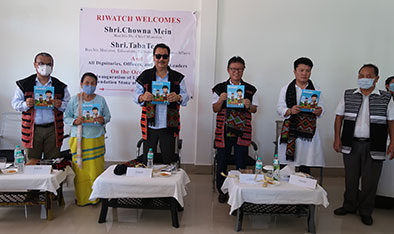[ Karyir Riba ]
ROING, 7 Aug: ‘Aasahi (Idu Azobra Level I)’ – the first ever Idu Mishmi language textbook for the primary level – was released on Saturday by Deputy Chief Minister Chowna Mein at the Research Institute of World’s Ancient Traditions Cultures and Heritage (RIWATCH) here in Lower Dibang Valley (LDV) district.
The textbook will be part of the school curriculum in all Idu Mishmi-speaking areas of the district.
An initiative to teach the younger Idu Mishmi generation their mother tongue, which is on the verge of extinction, this language textbook has been created by the Idu Tho Ahie Committee (ITAC), under the aegis of the Idu Mishmi Cultural and Literary Society (IMCLS).
ITAC chairperson Krishma Pulu informed that, since the Idu Mishmi dialect is a dying dialect, the textbook has been developed with the sole purpose of encouraging educators and learners to communicate in Idu Mishmi in the classroom.
IMCLS president Ginko Linggi informed that the apex body plans to “include textbooks for all primary classes in the future.”
“We hope the works in this direction will help in reviving and sustaining our mother tongue,” he said.
The DCM lauded the initiative and said, “We are surrounded by other languages and cultures, but it is our duty to protect our own language and culture. If you do not protect your cultural identity, you will be lost amidst globalization. It is most important to protect, preserve and promote your culture, traditions, language and heritage.” He added that “a revolution is rising in Arunachal in this regard, and the state government is fully supportive of this revolution.”
The DCM also laid the foundation stone of the second wing of the RIWATCH museum, and inaugurated the RIWATCH library. He said that the RIWATCH has the potential to become a research, learning, development and heritage centre in the near future.
Indigenous Affairs Minister Taba Tedir said that the indigenous people are “reducing in number more than ever.”
“We should preserve our traditions and culture. Priests/shamans have to be given due recognition. Promoting use of indigenous language is also very important,” he said.
Citing the example of the shaman school in East Kameng HQ Seppa and the RIWATCH in LDV, Tedir assured that “any assistance needed in working towards preservation of traditions and culture will be provided by the government.”
Indigenous Affairs Commissioner Prashant Lokhande said, “When we speak of development, it is not only about construction. The meaning of real development is way larger than that. Acceptance of modernity and adherence to one’s own culture, tradition and language should be merged for achieving the true sense of development.”
RIWATCH chairman Joram Begi spoke about the institute and how it focuses on the indigenous people. He lauded the state government for extending all help and support to the RIWATCH, which is a non-profit, non-governmental, community-based research organization “with a mission of empowering ethnic communities to prosper sustainably by strengthening their value system.”
RIWATCH executive director Vijay Swami and the institute’s academic advisor Sathyanarayanan Mundayoor also spoke.
Among others, MLAs Mutchu Mithi and Gum Tayeng, former MP Mukut Mithi, LDV DC KN Damo and heads of various departments were present at the programme. (With input from DIPRO)



